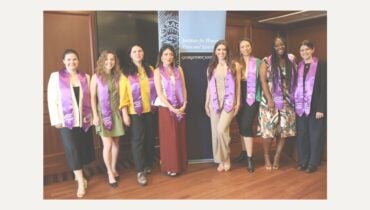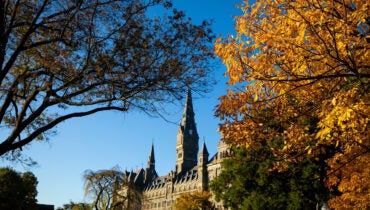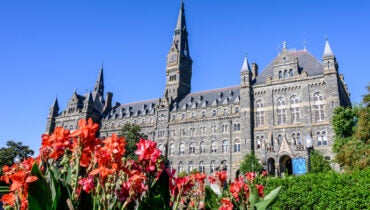Are you interested in learning more about women’s rights or international security, development, religion, or the environment? There are numerous undergraduate and graduate courses with a gender lens offered this fall for Georgetown students. You can use this blog post as a resource for making your course selections for the upcoming semester! Click through the course numbers to access the course descriptions on MyAccess.
Gender and Conflict – IPOL 241
Professor TBA
Women have become more visible in politics and started to occupy important roles in international organizations. But this is not the only story. Women also assume roles in international, regional or domestic conflicts, joining rebel groups or even terrorist organizations in insurgencies or civil wars. Women are also victims of conflict and targets of sexual violence in war. The complex relationship between gender and conflict requires attention and understanding. This course will analyze this interaction within the framework of various comparative cases: from Nicaragua to Kurdistan, from Syria to Northern Ireland, from Columbia to Sri Lanka, from Africa to Latin America.
Holocaust: Gender and Racial Ideology – INAF 175
Professor Anna Sommer
The class will discuss to what extent pre-World War II gender roles helped victims develop important survival skills, and also affected decisions of ordinary men and women to become killers. Using primary, secondary sources and film, we will discuss the experiences of men, women, and children during the Holocaust both from the perspective of victims and perpetrators.
Violence/Gender/Human Rights – WGST 260
Professor You-Me Park
This class aims to explore the gendered manifestations of violence in public and private spheres within the context of the more general relationship between globalization, development, and human/civil/citizen rights. Students will pay attention to banal violence (that is, daily and “banal” violence in everyday life), spectacular violence at moments of crisis, and the type of violence that disrupts the boundary between the two. Special emphasis will be given to the issues of racism, sexual exploitation, poverty, labor, health care, homophobia, militarism, and globalization.
Gender, Immigration and Social Justice – JUPS 290
Professor Kimberly A Huisman Lubreski
Over the past few decades, there has been a substantial growth in the literature on gender and immigration. Contained within this vast body of literature are real stories of immigrant women and men that capture the diversity of experiences among immigrants and raise many questions about social justice. In this course, students will explore the intersections between gender, migration, and social justice by engaging with a variety of texts across a range of disciplines and methodologies.
Population, Gender and Environment – ENST 247
Professor Patricia Biermayr-Jenzano
This course is designed to enhance students’ understanding of the interrelation of population and the environment/agriculture in different world regions. The class will focus on production patterns with a gender lens to understand the role of men and women in rural societies and that of Indigenous Peoples, who play a central role in preserving biodiversity to achieve food security. An overview of gender analysis and resource management will be presented in order to understand conservation strategies, both individually and collectively, and how males and females contribute differently to conservation and agricultural production efforts.
Gender, Health and Development – GLOH 414
Professor Myriam Vuckovic
This course provides a broad, policy-oriented introduction to the role of gender in global health and development. Students will reexamine what is meant by gender, analyze the consequences of gender discrimination, and develop pragmatic policy approaches to address gender differentials in health with a particular focus on developing countries.
Ethics and Development: Gender – INAF 493
Professor Katherine Marshall
This seminar combines reflection about international development challenges with a pragmatic exploration of how development practitioners and scholars contend with them in their daily work. It will approach the issues with a particular focus on a central goal: gender equality. The course explores how policy choices are framed and applied and why the challenges of poverty and social justice are so significant today. The class compares different approaches, ranging from security to political to moral to economic and to protection of the environment. Starting from the foundation of the human rights that have shaped the evolution and approach of much contemporary development thinking, the course explores what a rights-based approach implies and its strengths and weaknesses.
Gender and Sexuality in the Middle East – WGST 231
Professor Michelle Ohnona
The aim of this course is to explore the ways in which the social and cultural construction of sexual difference shapes the politics of gender and sexuality in the Middle East and North Africa. Looking at the ways in which the Arab Spring galvanized what some have called a “gender revolution,” the class will examine women’s roles in the various revolutions across the Arab World, and explore the varied and shifting gender dynamics in the region.
Politics of Gender: World Religions – THEO 179
Professor Lauve Steenhuisen
This course will examine the feminist and fundamentalist political movements active in world religions through the lens of such questions as: “Are Christian women fully redeemed in Christ?” and “Since the Qu’ran is egalitarian, why are the more restrictive passages more enforced?” The skills of scriptural interpretation and cultural analysis will be utilized.
Global Challenges, Changing World: The Rising Status of Women – INAF 207
Professor Shareen Joshi
Part of Term-5 weeks: 08/28/19-09/30/19
This set of classes examine the history and nature of our changing world – including the rising status of women. These courses will examine how global changes affect the United States and other countries. Students will learn the politics behind these issues, identifying the sources of resistance to cooperation, and the global cost of inaction, for issues ranging from the impact of climate change on poorer nations, the benefits of job creation overseas from trade deals, or the risks of emerging technologies on societies in conflict. The fourth perspective focuses on the need for inclusive solutions to these global challenges.


